Film
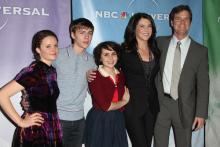
The writers of Parenthood, the popular NBC family drama, use an interesting device to dramatize conflict. When two characters have a difference of opinion their exchange begins in measured, even tones. One person talks, while the other listens. Then the second person talks, while the first one listens. But as their disagreement heats up, the exchange gets faster and faster until no one is listening and both characters are talking over each other so loud and fast that it’s difficult to understand exactly what they are saying. This clip is typical. It’s an argument between Sarah and her boyfriend, Mark, over whether or not she will be able to keep her promise to attend a weekend getaway with him.

Tired of cursing the darkness, my husband Mark and I wanted to shine a light. To do this, we set up a production company called LightWorkers Media. The Bible miniseries, born out of this intention and released last year, grew so popular that we were able to make it into our Jesus film, Son of God.
The Bible series was in its third week when Jesus began to appear on the big screen. There was great excitement that Jesus was coming, with our trailers, various talk shows and even Twitter buzzing with anticipation.
He was beautiful and strong and kind and compassionate. His presence uplifted and encouraged people. It was everything we had hoped for.
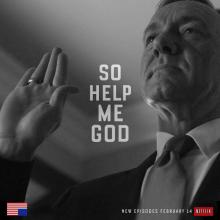
"Did you think I’d forgotten you? Perhaps you hoped I had. Don’t waste a breath mourning ... For those of us climbing to the top of the food chain there can be no mercy. There is but one rule. Hunt or be hunted." - Francis Underwood
So ends the Shakespearean soliloquy at the end of the first episode of House of Card's highly anticipated second season.
Underwood lives by a very clear code of ethics: Get to the top and do whatever is necessary to achieve that goal. For him, the end always justifies the means. And so, although it certainly made me wince to see what happens in Season 2's opening episode, I was left in awe at the show’s brutal honesty of what a life purely committed to power potentially looks like.
Some scenes perhaps strike us viewers as far from reality (Washington can't really be that bad, can it?!?), but other vignettes are far more plausible. Consider Underwood’s commendation of a congresswoman for making the cold, calculated decision to “do what needed to be done” by wiping out entire villages with missile strikes.
Her “ruthless pragmatism” merely makes Underwood smirk.
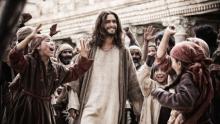
Christian leaders, including megachurch pastor Rick Warren, plan to rent every screen in numerous multiplex theaters across 10 cities for the premiere of Mark Burnett and Roma Downey’s upcoming Jesus film Son of God, on Feb. 27.
The unusual move reflects the confidence Christian leaders have in Burnett and Downey’s work in the wake of The Bible, a hit miniseries on the History channel.
The Son of God, an adaption from The Bible series, opens in theaters nationwide Feb. 28.

INSIDE LLEWYN DAVIS, the new Coen brothers film, is the mournful tale of a folk musician too dedicated to his art to make money or to accept love when it’s offered him. It has gorgeous music, performances that are like watching characters step off the pages of a Joseph Mitchell New Yorker story, and language that is exquisite, but not so much that we don’t believe it. A common response to Inside Llewyn Davis is that it’s a pessimistic film, with characters so self-centered and worn down by money and the lack thereof that they cumulatively produce a world of no hope.
Many assert that the Coen brothers have pitched their tent as the anchor tenants of cinematic melancholia—Fargo’s bleak focus is a family utterly destroyed by financial pressures and the inability to know where or how to ask for help; Barton Fink’s eponymous protagonist finds his dream writing contract ends up a descent into hell; and The Man Who Wasn’t There is finally executed because he doesn’t see the point in defending himself. Llewyn Davis is an impetuous man in a fickle industry, too out of touch with his own humanity to want to see his own child, and he is beaten up for heckling a fellow musician. And so people come out of this film depressed. To which my minority response is simple: Look closer. Inside Llewyn Davis is full of life and second chances and, yes, hope for artists. Davis has friends who care, and there are people who get what he does. Who cares if the world isn’t listening? That was never a measure of great art anyway.

Tom Junod of Esquire wrote an insightful piece about the death of Philip Seymour Hoffman titled “ Philip Seymour Hoffman’s Final Secret: The cost of holding up a mirror to those who could barely stand to look at themselves .” The whole article is worth reading, but these words are especially important:
"There was no actor, in our time, who more ably suggested that each of us is the sum of our secrets … no actor who better let us know what he knew, which is that when each of us returns alone to our room, all bets are off. He used his approachability to play people who are unacceptable, especially to themselves; indeed, his whole career might be construed as a pre-emptive plea for forgiveness to those with the unfortunate job of cleaning up what he — and we — might leave behind."
In his roles, Hoffman played unacceptable, despicable, and broken characters. In other words, he played our cultural scapegoats. But the beauty of Hoffman’s work is that he humanized our scapegoats. Of course, his characters were unacceptable because they were guilty of being repellent jerks, underserving of love or sympathy, which is exactly why they made good scapegoats. The function of a scapegoat is to unite us in hatred against them, so the scapegoat who seems to us to be completely guilty, like a cartoon villain, the better sense of unity we can form against them. The best scapegoat is one who even agrees with us about just how terrible he is. As Junod writes, Hoffman “used his approachability to play people who are unacceptable, especially to themselves.”
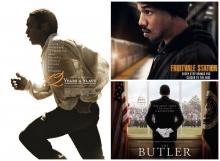
“CINEMA IS a matter of what’s in the frame and what’s out.” With this, Martin Scorsese, one of the greatest living U.S. directors, gives us a simple window to understand the power of cinema. What is in the frame is a choice by the filmmaker, and what is not highlighted is also a choice.
People of color, literally and metaphorically, have struggled to be included in the frame and fought to move from the background to the foreground of the cinematic imagination.
The U.S. cinema, historically, has been the vanguard of stereotypes and the enforcer of our racialized imagination. Our view of women, people of color, and ethnicities define and are expanded by the power of cinema.
D.W. Griffith’s 1915 silent film The Birth of a Nation was a revisionist history of the Civil War and Reconstruction that defined the Ku Klux Klan as the hero of the story and used white actors in blackface to frame black people as a threat to white society. This film, while not seen by the majority of filmgoers, set into motion the racial constructs we now view as normative. Black men, for example, have often been viewed in cinematic history as ethically dubious, highly sexualized, violent, or childlike comic characters.
These stereotypes created by the filmmaker’s imagination became, in the minds of many in the U.S., a historical fact. Cinema helped reinforce myths and arbitrary prejudices not based on cultural differences but created to protect economic interests of white Southerners who feared black labor.

Just as polar vortices sweep through America, Elsa, one of the main characters in the latest Disney princess movie, Frozen, unleashes her icy power in the fictional kingdom Arendelle, across theaters everywhere. In addition to delighting progressive audiences by satirizing Disney’s own trope of “marriage at first sight,” the story compels viewers, young and old, to find courage to be their true selves. The Oscar-nominated signature song, “Let It Go,” poignantly expresses the sentiment of letting go of fears, secret pains, and pretense. Fans of the song, from celebrities to little girls, have been belting the tune theatrically anywhere from kitchens to car rides to the Internet.
G.K. Chesterton says,
Fairy tales are more than true: not because they tell us that dragons exist, but because they tell us that dragons can be beaten.
A good story is more than a pleasurable experience — it empowers us to live a changed life. Frozen is filled with beloved characters and catchy melodies, but also has much to teach us about power, privilege, and community.

In days of old, God used a burning bush to get Moses’ attention. Today’s prophets are often the truth-telling artists, singers, songwriters, and filmmakers whose modern version of “Thus sayeth the Lord” bursts forth in a stunning, sensual explosion of sight, sound, and touch.
They get our attention, and their prophetic word is visceral. It often goes beneath the rational radar and it can disturb more than it comforts. The annual Sundance Film Festival is like a tribe huddled around a campfire listening to the stories. These stories function like burning bushes, as prophetic calls to action. These films are meant not just to be watched, but to change us and, through us, to change the world.
Here are some of the messages I heard at Sundance 2014.

CNN reports on Usoni , a futuristic television drama produced in Kenya that is about reversed immigration. The show depicts Europe in 2063, where life has turned unlivable after a deadly series of natural and economic disasters.
Europeans are desperately seeking a way to get to a livable continent south of them: Africa. The hardships in making the trip are unfathomable, and once the immigrants arrive, they are unwelcome, harassed, and rejected. The story follows a young couple, Ophelia and Ulysse, who are seeking to make their way with their unborn child to the land of promise.
Yes, the comparisons today to those seeking to immigrate to Europe (with obvious parallels to America) are intentional. Marc Rigaudis, the Kenya-based French filmmaker who created the program, is making a point to help us walk in the shoes of those whom we know the Bible calls “aliens and strangers.”
The chilling trailer depicting people like me being treated as illegal immigrants is enough to make one’s hair stand on end.

The old city of Jerusalem is smaller than one square mile. In 5,000 years of recorded human history there have been 180 conflicts around the city. It has been conquered 44 times, and completely destroyed twice. The story of conflict in this city is clearly not a new story.
When the producers of Jerusalem, a new movie for IMAX and other giant screen theaters, decided to approach the topic, they wanted to bring a fresh perspective to the long history.
“Jerusalem is a city in conflict,” said Taran Davies, one of the producers of Jerusalem, at a recent screening of the movie. “We wanted a new way to think about it. This [movie] is more a celebration.”
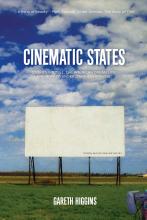
Lots of people like movies; Gareth Higgins loves movies. But the founding director of the Wild Goose Festival and long-time peace activist engages popular culture with a different eye than most of us. And he’s used that keen eye for deeper meaning to create his latest book.
I asked Gareth about his new book on American film, his peace work, and what it’s like considering American culture both as an insider and as a non-native. Here’s what he had to say.

Last week, I attended a screening of Documented, Jose Antonio Vargas’ film about his coming out as an undocumented immigrant after winning the Pulitzer Prize. His journey is honest, poignant, and humorous. A lesser subject would have cut some of the material showing the strain of the situation on his familial relations, but the film never flinches from the raw story.
I sat in on a panel discussion after the screening filled with members of an organization featured in the film, “DREAMers Moms.” I had a chance to speak with several of them, and one story stuck out in particular. One mom left her country for the good of her children so they would have hope of a positive future in the United States. She hasn’t seen her mother in 13 years and won’t until immigration reform is passed into law. If she leaves the U.S., it’s likely she wouldn’t be allowed to return and care for her children. This would leave them essentially orphans who would be placed into foster care. Her mother is now in her 80s, frail and sick. This woman is losing hope of ever again touching the woman who cared for her, but still prays daily for a miracle.
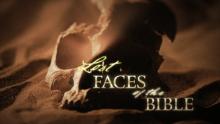
Many artistic renderings of biblical figures hang in churches and museums, but no one really knows what they and their contemporaries looked like.
Now, an international team of archeologists, forensic anthropologists, and facial reconstruction experts has tried to answer this question by recreating the faces of three adults and a newborn whose skeletal remains date back to biblical times.
A new four-part TV series, Lost Faces of the Bible (airing on the National Geographic Channel beginning Monday), follows the experts as they recreate long-gone faces utilizing the same state-of-the art technology used by police investigators.

Following the success of the History Channel's mini-series, The Bible, which appeared weekly last March, Hollywood seems to have renewed an avenue in which Biblical adaptations are allowed to enjoy a significant amount of limelight.
Two blockbuster titles are to set to be released in 2014: Paramount Picture's Noah and 21st Century Fox's Exodus. These two films both boast a star-studded cast as directors Darren Aronofsky and Ridley Scott hope to astonish audiences by combining stunning visualizations with two of the most popular accounts from the Old Testament, the Great Flood and the Exodus out of Egypt.
As a Christian and an avid movie-goer, I was thrilled to read that these two films were in production. However, once I saw the actors cast to play the leading roles in these two films, my excitement quickly turned to disdain. Not a single one of the leading roles in either movie was given to a person of Middle Eastern descent.
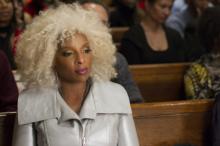
In her book “The Funny Thing Is …,” Ellen DeGeneres describes being invited to God’s house for wine and cheese. When the Almighty walks into the room, Degeneres describes God this way:
“I would say she was about 47, 48 years old, a beautiful, beautiful black woman. And we just immediately hugged.”
When I think about the guardian angels who I’ve been told surround me like spiritual body guards, I picture the Angel In Charge as looking and sounding a lot like the Grammy-winning singer Mary J. Blige.
How appropriate, then, that Blige portrays a character in the upcoming holiday film, Black Nativity, (based in part on the Langston Hughes play) who appears to be an angelic being with a huge platinum-blonde Afro, dressed head-to-toe in silver-colored leather.

It may be as close as a person can get to praying at the Church of the Holy Sepulchre, the Al-Aqsa Mosque and the Western Wall, without actually going there.
The newly released movie “Jerusalem,” filmed in 2D and 3D and playing on IMAX and other giant-screen theaters across the U.S. and the world, gives viewers grand, hallmark panoramas, at once awe-inspiring and intimate.
For years filmmakers had sought the rights to capture the city from the air, but never before had permission been granted, in part because the holy city is a no-fly zone.
Still, before filming began in 2010, producer Taran Davies came up with an extensive wish list of all the sites and rituals he wanted in the film, and presented it to advisers familiar with the spectrum of religious and secular officials who would have to approve.
“They all laughed and said forget about it,” Davies said. “They said, ‘It’s impossible and you’re not going to get half of what you’re looking for.’”
I RECENTLY saw a photograph of me taken on the day I was born: two weeks premature, swaddled, peaceful, vulnerable, beautiful—pure potential. I wanted to travel back in time to give the little guy some advice and protect him. Most of all I wanted him to experience the things I missed—those that only seem to come to our attention with the benefit of hindsight. I wanted him to take more risks for the good, not worry so much, be more open to receiving love, take more walks in fields and on beaches, and avoid a thousand mistakes. I wanted him to be different.
While wanting to undo history is probably a human universal, it can also be a kind of psychic violence, emerging from the notion that there is such a thing as the person we were “supposed” to be. Indulging this notion led to me projecting it onto three intriguing films. Short Term 12 is a lovely, painful story of recovery from childhood wounds. In Seconds, the newly restored melancholic science fiction tale of human engineering from 1966, Rock Hudson brilliantly imagines what happens when you convince yourself that superficiality is depth and exchange the life you have for cosmetic “transformation.”

Studios and filmmakers are rediscovering a classic text as source material for upcoming mainstream films: the Bible.
Nearly 10 years after the blockbuster success of Mel Gibson’s “The Passion of the Christ,” which earned $611.9 million worldwide, studios are looking to the Good Book for good material.
Alongside the string of upcoming Bible-related films, producers from the History channel’s “The Bible” miniseries just announced that the series’ film adaptation “Son of God” will be released in theaters nationwide in February with 20th Century Fox.

Am I the only one who finds it deliciously ironic that WikiLeaks founder Julian Assange objects stridently to how he is portrayed in the new movie, The Fifth Estate? The film, which hits theaters in wide release today, turns its attention to the organization best known for publicly sharing otherwise confidential information of various governments, including our own.
Assange is clearly a study in eccentricity. From his tow-headed locks to his lock-down work environment, he fascinates as often as he infuriates. To demonstrate their displeasure about the coming film, WikiLeaks actually leaked the screenplay to the public ahead of the movie release and has published numerous corrections they deem necessary to more accurately reflect history. They have also labeled the movie "irresponsible, counterproductive and harmful,” adjectives made that much more poignant, given that similar epithets have been leveled at WikiLeaks for their own work.
But despite this latest round of drama revolving around WikiLeaks and its lightning rod of a front man, the question still remains:
Is WikiLeaks good for America?